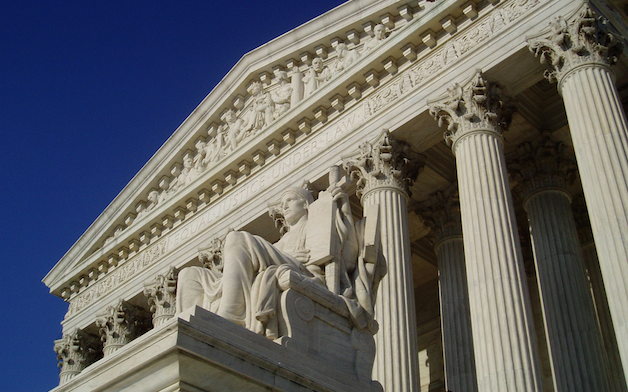Examining the court's reasoning on same-sex marriage

"It would have made much more sense if the court had made it clear that what it was opposing was the idea that the state could mark this sexual conduct, this sexual intimacy, as amoral." Michael Perry
 Emory Law Professor Michael Perry predicted discord would result from the US Supreme Court’s opinion in United States v Windsor. And indeed, a year after the 2013 decision, same-sex marriage cases were in progress in five federal appeals courts—the Fourth, Fifth, Sixth, Ninth, and Tenth Circuits.
Emory Law Professor Michael Perry predicted discord would result from the US Supreme Court’s opinion in United States v Windsor. And indeed, a year after the 2013 decision, same-sex marriage cases were in progress in five federal appeals courts—the Fourth, Fifth, Sixth, Ninth, and Tenth Circuits.
On June 25, one day before Windsor’s one-year anniversary, a three-judge panel from the Tenth Circuit US Court of Appeals became the first federal appeals court to find it unconstitutional for a state (particularly, Utah) to ban same-sex couples from marriage. Disagreement among the appeals courts will force the US Supreme Court to weigh in and issue a ruling for the entire country, he says.
Perry, Robert W. Woodruff Professor of Law, wrote last year he found the Windsor opinion “confused and confusing” and “gratuitously insulting to many who oppose the legalization of same-sex marriage.” The majority opinion lent itself to the view that the court believes people who oppose same-sex marriage do so because of a demeaning view of gays and lesbians, he says.
“In fact, many of the people who oppose the legalization of same-sex marriage do so on the basis of a view about the immorality of a particular conduct, not the moral inferiority of any human beings. That’s a hard point for people to wrap their head around, but it’s a very important point,” Perry says.
“It would have made much more sense if the court had made it clear that what it was opposing was the idea that the state could mark this sexual conduct, this sexual intimacy, as immoral. That’s a different issue,” he says. “There’s a whole line of cases in which the court is saying that there are certain kinds of moral judgments that the states may not make.”
In 2003, Lawrence v. Texas effectively invalidated antisodomy laws across the US. Rather than finding the Texas law invalid under the Equal Protection Clause, Justice Anthony Kennedy said the Due Process Clause gave gays “the full right to engage in private conduct without government intervention.” He also wrote, “Liberty presumes an autonomy of self that includes freedom of thought, belief, expression, and certain intimate conduct.”
At the time, Kennedy said Lawrence didn’t require the government to extend marriage or civil unions to same-sex couples. He did, however, note significant change in the nation’s laws and mores since Bowers v. Hardwick, a 1986 Georgia anti-sodomy case which Lawrence overruled.
“They show an emerging awareness that liberty gives substantial protection to adult persons in deciding how to conduct their private lives in matters pertaining to sex,” Kennedy’s opinion reads.
The speed of change in public opinion on lgbt issues since the Defense of Marriage Act became federal law in 1996 has been similarly, “breath-taking,” Perry says. “If ten years ago someone predicted that the Supreme Court of the United States would do what it’s done or what it’s about to do in the next year or two, that would have looked pretty implausible,” he says.
About 44 percent of Americans live in states where same-sex couples have been granted access to civil marriage. (Nineteen states and the District of Columbia allow same-sex unions.)
Internationally, the US is not an outlier in its national stance on same-sex unions. As of mid-2014, only 18 countries (out of 193 UN Member States) had approved same-sex marriage nationwide, according to Pew Research Center. It’s worth noting that in many of those 18 nations, change was driven by lawmakers, not judges, Perry says.
“Most of the countries outside of the United States that have admitted same-sex couples to civil marriage have not done so because courts required that they do so — they’ve done so because their Parliaments, their lawmakers, have decided to do so,” Perry says. “That obviously is less provocative because these are democracies and people understand that in democracies, your view doesn’t always win.”
In the United States, when change comes from the courts, those who disagree often complain it doesn’t seem very democratic.
Still, when religious organizations challenge the government in court, their objections deserve thoughtful examination, and Perry says one shouldn’t assume everyone who objects to same-sex marriage does so from prejudice.
“One of the major institutional voices opposing the legalization of same-sex marriage in the United States, the United States Conference of Catholic Bishops, makes it about as clear as one can make it that they regard gay and lesbian persons as fully human, equally human, equally beloved children of God — our brothers and our sisters,” he says.
“Their opposition is based on a moral view that ‘inherently nonprocreative’ sexual conduct is immoral, and that includes the use of contraceptives by a heterosexual, married couple,” he says.
“Similarly, their opposition to same-sex marriage is not based on a view that gays or lesbians are morally inferior human beings.”
The federal trial court decisions post-Windsor appear to echo Windsor’s suggestion that failing to recognize same-sex unions is a demoralizing, dehumanizing assault on gay citizens’ dignity.
The Defense of Marriage Act’s fatal problem, Perry says, was that its exclusion was based on the belief that same-sex sexual conduct is immoral.
Perry says a better approach in Windsor would have been to say the state has no legitimate juris-diction to reach into the realm of such personal, private behavior to declare it immoral — instead of suggesting those opposed to same-sex marriage view gays as less than human, a position that dissenters will continue to use to their advantage.
This story appears in the Fall 2014 issue of Emory Law Insights and can be read online, with an accompanying excerpt from Human Rights in the Constitutional Law of the United States (Cambridge University Press 2013).